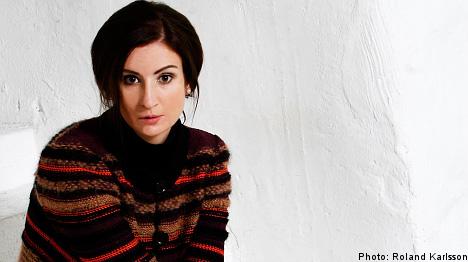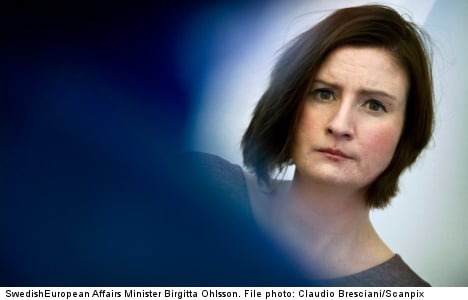“She is in many ways the antithesis of the sort of law and order liberal typified by her party leader Jan Björklund – she’s a true social liberal,” says James Savage, The Local’s political affairs commentator.
Like many high profile Swedish politicians of all stripes, Birgitta Ohlsson first came to prominence as chairperson of her party’s youth league – a post she held until 2002.
Since 2007 she has been chairperson of the Liberala Kvinnor women’s association. The role appears made to measure for Ohlsson, who has positioned herself as a high profile liberal feminist, something of an exception in an area otherwise dominated by the left in Swedish politics.
When the centre-right Swedish government assumed power in the autumn of 2006, Ohlsson was thus in contention for the post of Minister for Integration and Gender Equality.
This post however went to Liberal Party colleague Nyamko Sabuni and Ohlsson has instead used her position as the party foreign affairs spokesperson to argue for full Swedish Nato membership and the adoption of the euro.
A staunch republican, Ohlsson was chairperson until 2005 of the Swedish Republican Association, a group deeply sceptical of Sweden’s monarchy and enjoying broad cross-party support in the parliament.
While Ohlsson had been a hot favourite for the EU minister post ever since it became clear that Cecilia Malmström would become Sweden’s EU commissioner, there was also speculation that she would be overlooked by a party hierarchy unhappy with her refusal to tow the party line on several issues.
Some of Ohlsson’s most vocal objections came within the feverish debates that preceded the adoption of the anti-piracy Ipred law, and the FRA signals intelligence law, at one point threatening to vote against the government.
Ohlsson also argues that the childcare allowance introduced during the current mandate period traps women in traditional gender roles. She also advocates higher quotas for parental leave, a position espoused by the left-green opposition.
On her homepage, Birgitta.nu, Ohlsson details her support for open immigration, abortion and privatization, as well as opposition to the proposed language test for prospective Swedish citizens.
Asked whether Ohlsson’s strong views, often at odds with her party and with the government, could pose a problem with a general election looming, James Savage says:
“She is an ambitious politician. As such, I think she fully understands the constraints of collective responsibility now that she is part of the government.”
Birgitta Ohlsson is pregnant and is expecting her first child in July. There has been speculation in the media over the past week that this would prove a further hindrance to her fulfilling her role as a government minister.
Ohlsson roundly rejected the assertion in a recent post on her blog:
“I am married to a modern man and not a dinosaur. My husband and I plan to share our parental leave… For the media to refer to my pregnancy is just sad and tritely conservative. Maybe we are still living in 1950 and not 2010.”
Ohlsson is pro-choice on abortion issues and in June 2009 helped to launch the “Make Noise for Free Choice” campaign aimed at Ireland, Portugal and Malta, all Catholic countries that ban pregnancy terminations.
The petition called on the EU to classify the right to abortion as a human right, but Ohlsson later denied that the campaign’s intention was to use the Lisbon treaty to “force” the issue on member states.
With an election looming in October in Sweden, Ohlsson’s established social liberal credentials and radical liberal economic position may provide a boost to a government lagging behind in the opinion polls and seeking to attract centrist voters. Some commentators have voiced suspicions of party political opportunism.
“But make no mistake, Ohlsson is in the government to stay. If the government regains power then you can expect her to remain,” says James Savage.
Birgitta Ohlsson stated in a press conference on Tuesday morning that she wants Europe to be the most important voice for peace in the world.
On her homepage, the outspoken 34-year-old indicates that her ambitions do not rest there. Her dream job? – to work with human rights at the UN in New York.



 Please whitelist us to continue reading.
Please whitelist us to continue reading.
Member comments